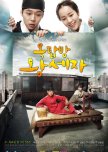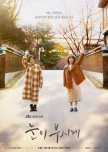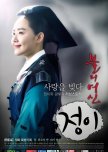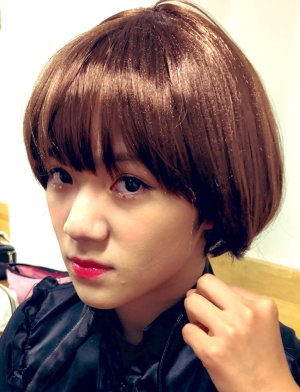
But My Only Love Song runs out of that very quickly: after those episodes, the vulgar side of the comedy and particularly the absurdly frequent and long repetitions (sometimes a third of an episode's running time!) stuck out too much to continue. With the new characters' arrival (eps. 5-6) it no longer made even simple sense.
I would've dropped it there, but I didn't due to funny circumstances that lead to going over the first half and thus wanting to get it finished. At first that choice seemed good enough, because with the protagonists' relationship becoming clear the drama turned a bit entertaining again, and it was possible to see all the foolishness around them and the "villain" as something amusing instead of stupid.
Yet the improvement didn't last long this time either.
From there, the series switched to drama and wasn't better written any for it—quite the opposite. That it tried to cope with more serious events showed how weak the writing's quality is. The plot and the pace were always messy, but I was especially disappointed in the characters' writing turning extremely unsteady and incoherent. If in one scene a character clearly feels despicable and in the next one you kind of like him, and then he's treated by the plot as despicable again, this just shows great inconsistency.
With how little I've watched, there were little gestures I still thought were specific to certain characters from other dramas, and My Only Love Song pointed them out simply as K-drama clichés, so it was also the cause for some disenchantment.
There were things I liked at the beginning, and I was curious about how the story would fare out. At some point I also thought the characters were peculiar enough to follow, until they also progressed insufficiently. Both the initial ideas and their later execution showed more holes as the episodes went on. Even simple aspects like the music were mixed and applied chaotically, not to say with very little taste.
It also didn't help to find out about Lee Jong Hyun's misconduct mid-way, as that added even more conflict and unpleasantness to watching it.
Overall, with the exception of the initial and some middle episodes, it worsened progressively and, despite being hesitant along the way, I finished it feeling clearly that My Only Love Song wasn't worth picking up, and even less finishing.
Was this review helpful to you?

My reflections on the reception for this dorama's age-gap story.
Once I completed this dorama I looked at the comments on MDL and I was disappointed to see how people freak out about the relationship between the two characters, reacting at as something nasty that has nothing to do with the present story's intent and message.Although romances with age gaps, especially if an underage person is involved, must undoubtedly not be treated unconsciously, Chugakusei Nikki is very delicate about how the characters' feelings for each other come to take place, and fully presents the difficulties that the teacher, as the oldest of the two, faces from both herself and others.
Criticism of their rather innocent and contained romance as "gross" thus seems unjustified to me because the series makes an effort to show how their love is entirely based on their wish to support each other, without any moral ill-intent whatsoever. If Kuroiwa were still within childhood that'd be different, but he's aware enough for that not to be the case.
It's particularly beautiful that their attraction emerges from them looking at each other as who they are beyond social positions or obligations, and how despite this the story is received from such a negative perspective makes all the sentiment of rejection which appears in the series very strong and real.
This opinion aside, the dorama wasn't as satisfying to watch as I could've expected because the two main characters' individual feelings aren't explored as closely after the first episodes. On one hand the series wants to arrive to the most mature decisions possible, which is praiseworthy, but on the other it gets stuck on all the obstacles that the characters face. Which is why from the middle onwards Chugakusei Nikki turns into a series of problems one after the other, and is much less engaging to watch.
This tiresome side was partly compensated by side characters that are interestingly well-defined and peculiar. I was especially drawn to Haraguchi for being such a resolute and extremely insightful woman, though I noticed she's not seen in a positive light by all watchers either. To me she was a really a unique character and with her onscreen, unexpected things could happen (and she always sped up everyone's pace and re-steered development, which I appreciated!).
All in all, it was still rewarding to see how the plot endeavoured to give some things to learn from, and especially how it succeeded in making of the events the basis that allowed the characters to grow to become better people.
Was this review helpful to you?

The drama itself ends up a bit disorganised, so I’ll try to make my review tidy in exchange.
PROS (some):
- Park Yoo Chun.
I was saddened to read that this amiable actor had been expelled from the industry. I thought him quite stiff for his role in Sungkyunkwan Scandal, but stiffness was partly what that role was about, and here he shows a lot more of what he can do. He brings a sort of sincere warmth (grumpy as the character may be) to the screen, so I would’ve liked to see more of his work.
- Songs.
Rooftop Prince has a fun soundtrack that was characteristic enough for me to want to listen to it later. Quite goofy most of the time, and the dramatic parts were REALLY repetitive (they also added a sort of hilarious effect to the serious scenes), but then its two main songs are beautiful. Quite a highlight to remember the series by.
- All-in-one plot.
If you think about it, this plot probably has a bit of most things you’d think of. Romance, family melodrama, impersonation, murder, time travel, reincarnation… And then royalty, working people, rich businesspeople…
CONS (all):
- Again, all-in-one plot.
The series starts off really enjoyable from the moderately simple time travel comedy premise, but all the different genres it keeps on adding disfigure it until it’s hard to recognise . This could’ve not been necessarily bad, but its pace becomes constantly uneven, and some characters are affected too. For instance, for some reason the second Bak-Ha, who let her hair loose, seemed to act like a different person than pigtail Bak-Ha (I definitely preferred the feistiness of the initial Bak-Ha. The follow-up was kind of mild).
- The “evil” characters.
Probably because Rooftop Prince has little moderation and lets its dramatic events run loose, the “bad characters” (permanent enemies of the “good characters”) are so bad that it gets ridiculous. Every time you think they've done their worst, they go further. Se-Na spits out lies like a printer prints, and it’s exasperating how anyone still believes her. And Tae-Mu is just dead-set on revenge to the point of absurdity. There's nothing else to his character; certainly no credibility, and the the actor didn't help. The way the plot dragged on into unnecessary complications simply because these two did was often weary.
- It brings out the negative sides to dramas.
For the two points above, this drama tried my patience. A LOT. Eventually, it began to show a lot of the negative traits that I would’ve expected from bad Asian dramas, and which kept me from watching them altogether. Because I’ve seen mostly very good ones I had evaded them until now, but a good deal of this drama had that clinginess or cheap-looking feeling in the conflict scenes, and enough dumb confusions in the happier ones to muddle the plot further.
CONCLUSION (also TL;DR):
The drama drags a lot in the middle and it also grows a little tasteless when it switches comedy for drama. The misunderstandings, revenges, etc. pile up with far too much repetition and, what’s worse, come distressingly close to a soap opera.
But although most I’ve written sounds negative, that applies to a section of the drama only, and I eventually did not regret watching Rooftop Prince. Most of the parts focused on the four-coloured tracksuit Joseonites were great to watch, and the drama is so long you eventually feel pretty close to the main characters. Some are quite endearing.
Through some episodes it was so slow and repetitive that it exhausted my patience, but usually a better scene came up in-between to revive my interest. The underlying mystery that is present in the story from beginning to end was usually an aid in this, as the hints come up (very) gradually and build on slowly towards a very satisfactory ending, difficult as delivering one seemed.
Endings tend to be very personal so it might not work so positively for everyone, but this one redeemed a lot of the series for me. The last episode sorted out all the continued problems better than I thought it'd be able to, and on top of that it left me feeling good towards the series as a whole. It’s the endearing sensation that only series that have been worth watching can pull off.
Was this review helpful to you?

The Light in Your Eyes shows a lot of the contempt and belittling that old people receive. The story deals with this often in a wide array of situations, trying to reflect what it feels like to be old, and at times how age becomes a sole reason to be disregarded.
Even more interestingly, it gets to show it from an audience perspective as well, and that’s really infrequent in pro-youth, always glamorous K-drama. I saw lots of comment from people who were just waiting for the old version of Kim Hye Ja to go away (seeing all she did as wrong) and the 25-year-old to return, refusing to believe that the “grandmother” is the main character (and also despite the fact that Kim Hye Ja is a better actress than Han Ji Min. I do not intend to take away from what Han Ji Min does, but the skill from the older lady really shows).
In fact, after it seemed her old version had done all she could for the story, even I was eager for the protagonist to go back to her younger self so that all the characters could have a better life. It’s a pretty sad symptom, but it’s good that Dazzling is able to bring it out clearly.
As it happens there is a lot the drama wants to bring out—on the sad side. Scamming, solitude, neglect, bitterness. It communicates these aspects of real life well enough that one can actually learn something from it, despite the inconsistencies visible in the plot if one looks away from it as separate, isolated scenes or cases and sees it whole.
And there are many inconsistencies.
Dazzling is unredeemably slow. I thought it was about to pick up after episode three, but it didn’t. And this happens with a lot with many things in the drama. When a character is about to make sense, something happens that changes them and it’s as if we didn’t know them at all. When it looks like the plot is going to progress at last… the turning point never comes. The episodes throw one bait after another to make you look forward to a scene, or tell you “this will solve it!” and it never comes, it doesn’t work out like that. “Bad guys” get away as they please and do what they want, the good characters are certain comic relief at times but often don’t do more than that.
Neither the changes of pace nor the connection between one event and the next are well done in the slightest, and it really hurt my patience to find out things such as a couple of episodes being spent on a “lost” dog to then find out that after that dramatic problem was “solved”, the dog was just never brought up again.
Examples like these are later pushed aside due to more important events, but it makes the episode-by-episode watching frustrating nonetheless.
Summarising over the categories, in “Story” it’d be helpful to be able to differentiate between premise and execution, because in a case such as this one I’d definitely use that. The soundtrack doesn’t stand out at all, and on the other hand the acting is great and for many characters it gets better and better as it goes on (Han Ji Min’s which I mentioned above, for instance). And I’d never think of re-watching this drama.
Overall, this drama is strange. The premise isn’t the reason as much as the uneven, tremendously hole-filled plot of inconsistent tone, content and pace. It’s especially weird because most characters do earn a place for themselves and are sensitively defined even among all those fragrant issues.
I would decidedly not “recommend” The Light in Your Eyes because it’s actually really hard to watch. It takes constant patience, it’s tremendously boring every few scenes (it brings your interest back up in-between so that you still watch) and often I couldn’t convince myself that I wasn’t just plainly wasting my time, and there’s something that will test even the most tolerant viewers. (Something which I’m leaving out entirely in this review and that would change the context of some things I’ve written entirely.)
However there is good in this story as well, some of it rare and a lot of details very worth-watching. And depending on how you take the plot-choices, watching it whole might actually make you love it more, rather than less.
Was this review helpful to you?

Drama with a unique historical subject that I loved, but not without some frustrations.
What mainly attracted me to watching Jung Yi was the subject of creating ceramics and pottery. The series is very detailed and creative about each part of the making process, and being able to observe the craft like this was a rare opportunity that I really appreciated. I loved both the way drama dealt with these scenes and being able to watch them closely.[STORY] The downside comes with the surrounding stories not directly focused on the making of ceramics and/or the main characters. The premise as a whole is really attractive as well, but when it comes to the development it shows that there are many episodes that must be filled somehow. Some storylines in particular are repeated very similarly and often, which really slows down the pace and made a contrast between boring episodes and exciting ones. Most scenes about the naming of the Prince Heir are all pretty much the same and hence tiring, and the princes framing each other or the protagonist getting into trouble (by herself or by someone else) and seeking to take the blame afterwards are situations which occur countless times.
[CAST] Another obstacle I found was the change of cast after the first few episodes. The young actors for the main three were doing very well and I had got fond of them (especially, I think Jin Ji Hee—young Jung Yi—is fantastic as a fiery and strong-willed girl), and it took me a long time to get accustomed to the new ones which I didn't like as much. Partly, this was also due to the characters' personalities feeling "weakened" after they grow up (not few episodes pass until they recover their former selves) and because the whole tone of the story suffers from this. As I first saw it, Goddess of Fire went from its strongest and most beautiful episodes (around 3 and 4) to goofy comedy situations that dragged on inconsequentially.
I got through that I was rewarded with the characters' evolution once again (even if from scratch), several good scenes between them and getting to appreciate the new acting, as well as the ceramic and pottery making becoming more complex and interesting according to the growth of the protagonist's skills.
Therefore the most frustrating of all was seeing how the characters and story I had grown to like twice over end up after the chaotic last episodes. Near the end there are many events I thought unnecessary or didn't understand why they had to happen that way, but once I finished the series I realised that there was a certain conclusion set for the drama and every other plotline is pushed and rushed into it unfulfillingly. Besides delivering puzzling last minutes, it's unfortunate to have the disappointingly abrupt ending as the last seen since it overshadows other far more memorable and heartwarming moments from the series.
[RE-WATCH VALUE] These three issues are the reasons I wouldn't think of going through the entire drama again, however there was a lot it offered in its first viewing and became very good company for long watching sessions. For the remaining category, [MUSIC], I only have to say that, although I found some modern tracks unfitting initially, they became less noticeable, and most importantly there were a couple of pieces of music I always liked to hear and accompanied key scenes excellently.
[OVERALL], it took some determination to continue watching at first, and I always suspected from the drama's tone and pace that the ending wouldn't be to my liking, but along the way there was more than enough good content to not regret at all having watched it whole. It offered the almost two different worlds of the characters' youth (impulsive, refreshing and carefree), and their more mature and complex relationships later as they develop trust and acknowledgement of one another.
Goddess of Fire has all the attractiveness of a historical drama while it is unreservedly dedicated to the art of ceramics in the Joseon era, and regardless of how it worked in the details to me that's an excellent combination.
Was this review helpful to you?








